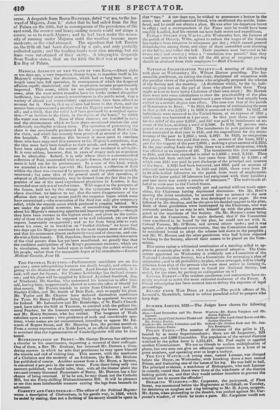MEDICAL ACCOUNT OP THE STA'rE or THE KING— About eight or
ten days ago, a very important change began to manifest itself in his Majesty's symptoms: the diuretics, which had so long been inert, at length came into full operation, in consequence of which the dropsical effusion rapidly diminished, and the respiration became proportionably improved. This event, which we not 'infrequently witness in such cases, after the most active remedies have for weeks seemed altogether inefficient, has excited so much astonishment in the public mind, that a variety of absurd and contradictory explanations have been offered to account for it. One is, that an a!acess had burst in the chest, and the matter been expectorated ; another, that his Majesty never had dropsy at all ; and a third, that the relief had been produced by a surgical opera- tion—" an incision in the chest, in the region of the heart," by which the water was removed. None of these rumours are founded in fact; and the circumstance which we have above mentioned renders the case sufficiently intelligible without them. The operation of puncturing the chest is one occasionally performed for the evacuation of fluid within the chest, and which has recently been practised at several of the Lon- don hospitals. We mention this besause it must serve to convince those who have suggested this measure to his Majesty's attendants, that the idea must have been familiar to their minds, and would, no doubt, have been adopted, had the nature of the case rendered it advisable. It is very seldom, however, that in cases of dropsy such an expedient can be admissible. Indeed, it is only where there is a circumscribed collection of fluid, unattended with organic disease, that any encourage- ment is held out for its performance. In a case of this kind, which we attended a few weeks ago with Mr. Lawrence, a collection of fluid within the chest was evacuated by puncture, and the gentleman speedily recovered ; Nit some idea of the general result of this operation, if adopted at all indiscriminately, may be formed from the fact that in the practice of one of the most experienced physicians in London, it has succeeded once only out of twelve times. With regard to the prospects of the future, held out by the change in the symptoms which we have above described, we lament to say, that the mere disappearance of the effusion does not by any means justify the sanguine hopes which some have entertained ;—the evacuation of the fluid can only give temporary relief, while the organic cause which produced it remains behind. We are under the painful necessity, too, of contradicting the statements about his Majesty's returning appetite and improving strength :—though they have been current in the highest circles, and given on the autho- rity of those who might be supposed to be well informed, yet are these reports lamentably exaggerated ; and so far from being able to walk across his room, or to breakfast on "broiled chicken," we know that two days ago his Majesty continued in the most urgent state of debility, and that his sustenance almost exclusively consisted of clove-tea, and can- dle with a little brandy. Till, therefore, there be more decided renovation of the vital powers than has yet been manifested, we greatly fear that the confident anticipations of the King's permanent recovery, which are in circulation, must be looked upon as indicating the ardent wishes of his people, rather than the reasonable hopes of his attendants.—London Medical Gazette, June 19.


























 Previous page
Previous page